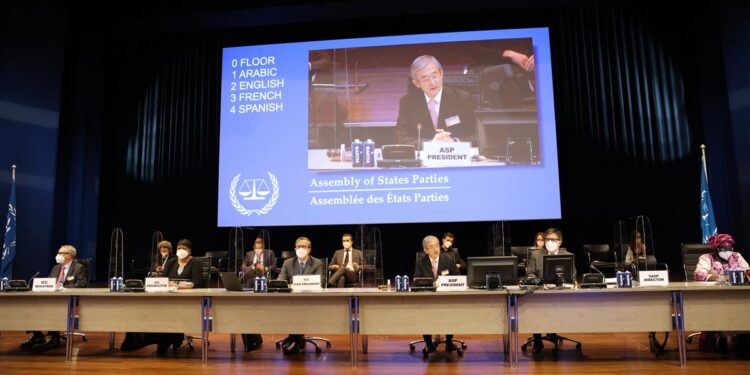The 20th session of the Assembly of States Parties to the Rome Statute of the International Criminal Court will be quite different from last year’s in one aspect: There is a new Prosecutor in office and the states parties do not have to grapple with a process that had become quite complicated as they sought to find a replacement for the second Prosecutor, Fatou Bensouda, whose term was ending in June 2021.
Granted, the election of the two deputy prosecutors is on the agenda, but the process is not expected to attract as much controversy and take as long as the one that led to the selection of the third Prosecutor, Karim A. Khan QC.
This year’s session of the Assembly of States Parties (ASP), which will open on December 6, 2021, at the World Forum Convention Centre in The Hague, The Netherlands, will also be the Prosecutor’s first as he settles into his new office, which he assumed last June after being elected in February.
Like last year, in-person participation will be limited as the session will be held remotely, with Covid-19 containment measures being applied. States parties to the Rome Statute, observer states, invited states, international and regional organisations, and representatives from civil society will discuss the key challenges facing the Statute.
Civil society organisations will follow the proceedings closely to make sure countries support international justice and advance efforts to strengthen the court and the Rome Statute system. They will only be allocated 16 in-person seats in total, while states parties and observers will be allowed four representatives each to attend in person.
Numerous virtual side events will take place around this year’s ASP session and will provide an opportunity for enhanced dialogue around specific topics of mutual concern, including situations under investigation or preliminary examination, International Criminal Court (ICC) and ASP election processes, judicial and political developments, and other issues related to the court and the Rome Statute system.
The side events also provide an avenue for non-governmental organisations to raise their voices around specific topics of mutual concern.
On the ASP’s agenda will be discussions on several activities, including the overall response of the International Criminal Court to the “Independent Expert Review of the International Criminal Court and the Rome Statute System – Final Report” of 2020, reports on the activities of the court, the ICC’s proposed programme budget for 2022, and the election of the two deputy prosecutors.
Ahead of the 20th session of the ASP, which ends on December 11, 2021, Human Rights Watch published a briefing note on November 30, 2021, setting out recommendations to states parties in what it considered to be priority areas. These include review of the ICC and the Rome Statute system; bolstering political support for justice; building on lessons learned from efforts to push back against the Trump administration sanctions levied against court officials; protecting the civil society space; the election of the deputy prosecutors and other steps to strengthen assembly elections; and ensuring adequate resources, including when it comes to protecting defence rights.
The International Federation for Human Rights (FIDH) also recommended strengthening the court and urged states parties to do better in their cooperation with the ICC. The FIDH said states parties’ assessment and adoption of the budget must follow a needs-based approach, and that states must uphold the fundamental principles of the Rome Statute that guarantee victims a role in ICC proceedings.
The states parties were asked to encourage the ICC to address gender equality in recruitment processes. The human rights organisation recommended that elections be conducted with integrity. It said the findings and recommendations of the Independent Expert Review should be carefully assessed and promptly implemented.
The Assembly of States Parties is the management oversight and legislative body of the International Criminal Court.
It is composed of representatives of the States that have ratified or acceded to the Rome Statute. Each state party has a representative who is proposed to the Credential Committee by the head of state or government, or the minister of Foreign Affairs (Chapter IV of the Rules of Procedure of the Assembly of States Parties).
The Rome Statute is the founding treaty that established the ICC. It was adopted at a diplomatic conference in Rome, Italy, on July 17, 1998, and entered into force on July 1, 2002.
The Assembly of States Parties has a Bureau, consisting of a president, two vice presidents, and 18 members elected by the assembly for a three-year term, taking into consideration principles of equitable geographic distribution and adequate representation of the principal legal systems of the world.
Some 123 countries are states parties to the Rome Statute of the ICC. Out of these, 33 are African states, 19 are from Asia-Pacific, 18 are from Eastern Europe, 28 are from Latin America and the Caribbean, and 25 are Western European and other states.
Silvia Fernández de Gurmendi is the current President of the ASP, elected in February 2021 for the 20th to the 22nd session (2022-2023).







